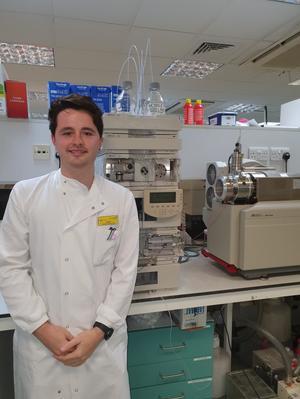Kade Flowers, Clinical Biochemist

Clinical biochemistry involves determining the chemical make up of many different bodily materials to help diagnose and effectively treat many diseases.
Kade Flowers is a Principal Clinical Scientist at University Hospitals Sussex NHS Foundation Trust. Kade is planning to sit part 2 of the FRCPath exams to become a qualified Consultant Clinical Scientist in the near future
Kade talks to us about his role and a typical day as a Clinical Biochemist.
Can you tell us what clinical biochemistry is?
Clinical biochemistry involves determining the chemical make up of many different bodily materials to help diagnose and effectively treat many diseases. For example, biochemistry involves testing blood, urine, faeces, sweat, cerebral spinal fluid, renal stones and many other body materials. Common biochemistry tests include (but are not limited to) testing the blood to monitor kidney, liver, heart, thyroid, etc function, as well as testing faeces for blood as a sign of cancer.
Can you tell us about your average working day?
Every day is quite different, but an average day would involve interpreting and authorising myeloma (blood cancer) electrophoresis screening reports from the previous day as well as other specialist test reports such as sweat tests for cystic fibrosis. Most days include meetings with other lab professionals, as well as clinicians, to discuss clinical and technical biochemistry matters. When I am the duty biochemist, the day can be different as this may involve running around the lab to solve issues and providing clinical advice to doctors and nurses. On some Fridays, I attend ward rounds to help doctors, nurses, pharmacists and nutritionists monitor patients who cannot eat normally and are being fed directly into their blood instead (total parenteral nutrition [TPN]), where I advise on any additional testing or changes to the TPN that can help. Many days also involve more stereotypically ‘scientific’ duties including troubleshooting tests that are not working properly and putting changes in place to improve how tests work.
What kind of work does your job involve?
It can really vary depending on the needs of the service. Most days involve using knowledge to interpret often complicated data to produce understandable reports for doctors and nurses. Some days may involve helping out in the lab directly running tests if we are short staffed. Other days involve talking directly to clinicians to provide them with clinical advice regarding patients with complicated biochemistry results. Also, as a senior member of staff, I am frequently involved with the day to day running of the lab, including helping to organise staff and prioritise workload. A common theme in every duty is using biochemistry knowledge to interpret data and communicating this effectively to clinicians.
Why did you choose this specialty?
I love biochemistry mainly because of how varied the nature of the work is. Biochemistry can involve analysis of so many different types of bodily materials (e.g. blood, urine, faeces, sweat, cerebral spinal fluid, kidney stones etc) which requires a very broad scope of knowledge. I also really enjoy the variety of the work as most days vary in duties, so I never get bored due to repetition. Another one of my favourite things about biochemistry is the requirement to talk to many different types of clinicians – including doctors, nurses, pharmacists, dieticians, etc - about many different clinical and technical issues that are affecting real patients.
What do you enjoy most about your chosen specialty?
The thing I enjoy the most about biochemistry is the range of topics that I must have advanced knowledge on. For example, I am required to understand many clinical aspects including how the kidneys, liver, heart, brain, hormone (endocrine), etc systems work so that I can provide appropriate clinical advice to clinicians. Equally, I am required to understand complex scientific data such as how all the biochemistry tests work, how to monitor their performance and how to fix them when they go wrong. This huge variation in required knowledge means I am always interested in the day-to-day issues that present in the biochemistry lab, and I never feel bored or have the feeling that my knowledge and skills are ‘too specialised’.
What do you find most rewarding about the role?
It is very likely that many patients will have delayed diagnoses without my help and quick communication, and this is a very rewarding aspect of my job in biochemistry.
The most rewarding thing is helping clinicians to correctly diagnose patients who may have otherwise been missed without my help. A quick example would be picking up on a low blood sodium result and adding on tests to make sure the patient does not have potentially fatal adrenal failure, where I have picked up many cases that have led to correct treatment. Another aspect that is rewarding (and also frequently sad) is being the first person to know that somebody is very unwell after reviewing their biochemistry results before a clinician has seen them, and then talking to the clinician quickly to make sure the patient gets the help they need as quickly as possible. It is very likely that many patients will have delayed diagnoses without my help and quick communication, and this is a very rewarding aspect of my job in biochemistry.
What advice would you give to students looking to enter your field?
Try and get into a biochemistry laboratory to have a look around if you think you may be interested. Many people often have unrealistic views regarding how a clinical biochemistry laboratory functions, so making you understand the realities of this is essential. Also, get in touch with some biochemists if you can (LinkedIn is a great resource) to talk about their job in order to make sure that you are interested in working in biochemistry, and getting in touch may result in you being shown around a real clinical laboratory.
